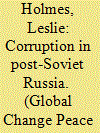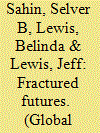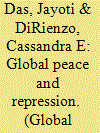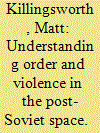|
|
|
Sort Order |
|
|
|
Items / Page
|
|
|
|
|
|
|
| Srl | Item |
| 1 |
ID:
112796


|
|
|
|
|
| Publication |
2012.
|
| Summary/Abstract |
Corruption has been a serious problem in post-Soviet Russia - though there was also much more of it in Soviet Russia than is generally realised. This article considers the scale of the problem, its causes and what both the authorities and civil society are doing about it. It argues that President Medvedev has been genuine in wanting to reduce corruption, and much more committed to this than either of his predecessors were. But corruption is so widespread and pervasive in Russia that it will take many years to bring it down to 'reasonable' levels; Medvedev's political will is a necessary but insufficient condition, and he requires greater political capacity and support. Moreover, since Putin has been elected to become president again (March 2012), the anti-corruption momentum built up by Medvedev will dissipate, unless Medvedev is made prime minister and given both full support and free rein by the president to pursue his anti-corruption drive.
|
|
|
|
|
|
|
|
|
|
|
|
|
|
|
|
| 2 |
ID:
112799


|
|
|
|
|
| Publication |
2012.
|
| Summary/Abstract |
This paper examines Indonesia's democratic state capacity-building in terms of transformations in West Timor, particularly around manganese mining. It is structured on the basis of three complementary sets of arguments. Firstly, democratic capacity-building is essentially a power-driven process as it seeks to re-arrange the way in which power is distributed. This process is shaped by the relative capabilities of a variety of societal interests struggling to dominate the control of state power at multiple sites of a highly competitive 'field of power'. Secondly, Indonesia's democratic decentralisation experience has produced uneven results, both between and within provinces. This is largely because the dynamic of the reform process is determined by the relative capabilities of competing social forces to engage in the political landscape and influence revenue generation and resource management policies. Thirdly, manganese mining, which has recently emerged as a quick method of revenue generation in resource-poor West Timor, provides an important case study that reflects the structural dynamics of state (in)capacity.
|
|
|
|
|
|
|
|
|
|
|
|
|
|
|
|
| 3 |
ID:
112798


|
|
|
|
|
| Publication |
2012.
|
| Summary/Abstract |
Past research and historical events suggest that the relationship between the peacefulness of a country and the degree of political and civil liberties afforded to its citizens has an inverted U-shape relationship such that the greatest unrest is observed at an intermediate level of freedom. Using the Global Peace Index (GPI), developed by the Institute for Economics and Peace (2010) in collaboration with the Economist Intelligence Unit, this study empirically tests this relationship and the results offer support for this nonlinear relationship. It is argued that while highly repressed societies experience a 'controlled' peace, highly free societies also experience peace stemming from the basic freedoms such as the right to expression and assembly and participation in policy creation. Alternatively, when political and civil freedoms are at some intermediate level, the freedoms offered may not be strong enough to serve as a substitute for protest, yielding greater conflict, crime, and less peace. Policy implications of the findings are also offered.
|
|
|
|
|
|
|
|
|
|
|
|
|
|
|
|
| 4 |
ID:
112797


|
|
|
|
|
| Publication |
2012.
|
| Summary/Abstract |
It is 20 years since the violent disintegration of Yugoslavia and the more peaceful, but still problematic, break-up of the Soviet Union. The on-going question of the status of Kosovo, continuing international involvement in Bosnia, the dormant conflicts in Transdniestria and Nagorno-Karabakh, recurrent violence in the North Caucasus, and the 2008 war between Russia and Georgia show that issues surrounding the break-up of both states remain pertinent today. This paper considers, firstly, whether norms surrounding self-determination and secession have been developed in response to events in former Yugoslavia and the former Soviet Union. Secondly, it examines what ideas of the nation have emerged: for example, does the civic/ethnic distinction apply or is it too simplistic or value-laden, and what norms if any of citizenship are developing? Thirdly, the paper considers whether regional integration is helping to overcome tensions around national boundaries and membership, or whether it is instead creating competition between outside actors (particularly the EU and Russia) to gain influence over the countries 'in between', at the same time as exacerbating internal tensions in countries such as Ukraine and Serbia over their foreign policy orientation.
|
|
|
|
|
|
|
|
|
|
|
|
|
|
|
|
| 5 |
ID:
112794


|
|
|
|
|
| Publication |
2012.
|
| Summary/Abstract |
This article critically engages with recent scholarship that casts Russian foreign policy either in terms of a gradual evolution towards neo-imperialism, or alternatively as an episodic series of shifts on issues such as terrorism, energy, relations with great powers, and Russia's geostrategic position in contemporary international politics. It argues that since the end of the Cold War what has been striking about Russian foreign policy has been its continuity. To do this it examines several key policy arenas, including Russia's attempts to construct regional architecture to embed its hegemonic position; its recent preference for resource diplomacy, and its use of military force. It finds that while Russia has struggled to maintain hegemony in the former Soviet space due to the ongoing problem of weak material capabilities, the 'assertive' form of realism that characterizes its foreign policy has not altered significantly since shortly after the collapse of the USSR.
|
|
|
|
|
|
|
|
|
|
|
|
|
|
|
|
| 6 |
ID:
112795


|
|
|
|
|
| Publication |
2012.
|
| Summary/Abstract |
Following the end of the Cold War, the discipline of international relations has benefited from a plethora of old, new and hybrid approaches to understanding order and violence. Yet amidst the scholarship on 'new wars', neo-medievalism and a range of alternative approaches such as human and critical security, the goal of understanding the motives, nature and limitations of contemporary uses of force remains elusive. This article attempts to shed light on this issue by reconsidering three traditions in conceptualising order and violence: the Grotian, Kantian and Clausewitzian traditions. It applies the respective emphases of each (legitimacy and law; moral imperatives; and Realpolitik) to the two Chechen wars and the 2008 Russo-Georgian war. The article demonstrates that while the prescriptive elements of the normative Grotian and Kantian traditions may well reflect the future trajectory of political violence, war continues to be fought for clear political motives relating to statehood and power. Based on the cases assessed here, the Clausewitzian tradition remains the most appropriate way to understand violent conflict in the post-Soviet space.
|
|
|
|
|
|
|
|
|
|
|
|
|
|
|
|
|
|
|
|
|